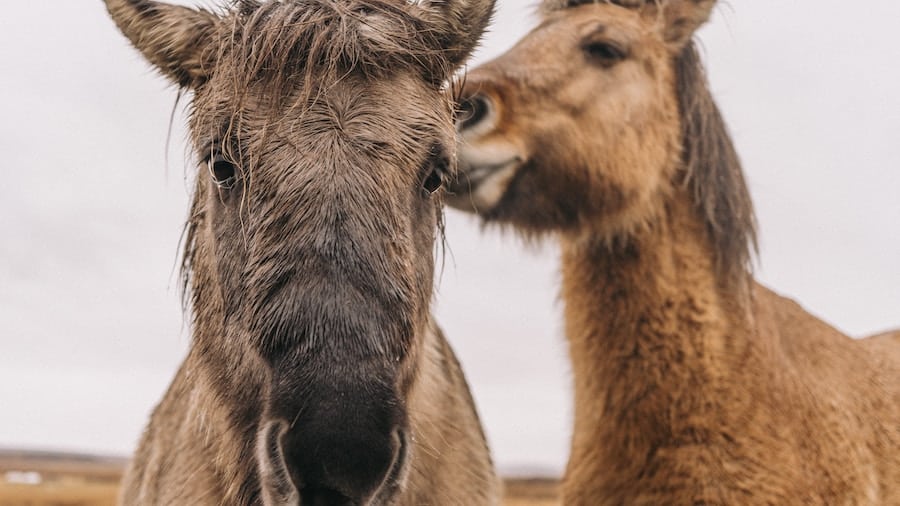What size does a mini donkey get? When I first heard that “Mini Donkeys” existed, I right away assumed they would be fuzzy and adorable, and like most people who don’t know any better, I automatically referenced the movie Shrek. It wasn’t until we rescued/adopted two of these cute critters that I had to learn their actual size and how much space they actually require.
So, how big do mini donkeys actually get? Most mini donkey size is 32 to 34 inches tall; however, a mini donkey cannot be more than 36 inches at the withers (the ridge between the shoulder blades) to be considered for registration. A fully-grown miniature donkey should weigh between 200 and 375 pounds (90 and 170 kilograms).
We were about to undergo a whole new species on our little farmette and these rescue animals were going to take up more space than I had thought. Time to learn more before our new friends arrived.
Mini Donkey Size: Height and Weight
The word “miniature” is usually attached to animals that have been “bred-down” to keep a smaller size. Contrary to my initial thoughts, miniature donkeys are not “bred-down” versions of a regular donkey. Unlike a toy poodle or miniature Australian Shephard, mini donkeys are naturally sized that way!
Native to Mediterranean islands of Sicily and Sardinia, there were roughly 30 of these animals originally imported into the U.S. and they ranged anywhere from 32 to 38 inches tall, with the majority of them being 35 to 37 inches. Throughout years of breeding, focus was on the smaller size of donkeys.
Donkey breeders tended to focus on animals that were 32 to 34 inches tall – creating the size we desire today.
Today, the most sought-after size for mini donkeys is anywhere from 31 to 35 inches at the withers (the ridge between the ground and the shoulder blades). A standard donkey can range from 36 to 48 inches tall, for comparison. The smaller the donkey is, the more valuable it is considered to be.
The smallest donkey recorded is just a hair over 25 inches tall. KneeHi is his name. You read that right. KneeHi. How adorable is that?
These animals are supposed to be small and compact with strong legs – all parts symmetrical for balance.
After an average 12 months of gestation, a baby mini donkey will weigh between 18 and 25 pounds, maturing to an earthshaking 200-425 pounds (well, not earthshaking, but it’s still quite a bit of weight for something deemed “mini”). Most mini donkey’s size will wind up in the lighter of that range. Keep in mind, a normal donkey, not “miniature,” will weigh in somewhere between 400 and 500 pounds (181 to 227 kilograms).

How to Deal with an Underweight Miniature Donkey
Mini Donkeys are very laid back by nature, they will not necessarily let it be obvious if they are ill. If your donkey isn’t eating, or If your mini donkey is underweight, before making any changes to their diet, get a vet to determine any possible health issues. There are numerous things that could be contributing to the loss of weight, such as:
- Age
- Neglect
- Loss of another donkey or companion
- Food quality
- Some type of dental issue
- Seasonal effects
An underweight donkey should not be overfed to compensate for steady weight gain. If there is an increase in food needed, the amount needs to be increased gradually over time.
If it is during colder months and the donkey is severely underweight, it should be housed in a shelter and blanketed to keep energy consumption to a minimum.
Mini Donkey Size: How to Deal with an Overweight Mini Donkey
It is important to deal with an overweight miniature donkey as-soon-as-possible; however, it is also important to not try to get the animal to drop excess weight too quickly. You will want to feed a food that is low in calories but has plenty of fiber. An increase in physical activity will also play an important role in weight loss – for best results combine a dietary change with more physical activity, which is advice I should probably take myself. Insert laughter.
- Rapidly changing diet or starving an overweight miniature donkey could cause unnecessary stress or hyperlipemia
- Feed your donkey small amounts of food, frequently. This will mimic how the donkey would eat in its natural wild habitat
- Be sure to keep away from any sugar or cereal-based treats or foods.
- If your donkey is allowed full access to graze on grass, create a bare or sand floored pad where the donkey can be kept away from constant grazing
- Make a move a change to the surroundings. Move the location of the donkey’s water in relation to the feeder and move the shelter (if possible) far away from the feed as possible. This will help to encourage maximum movement from your donkey and its routine throughout the day.
What is the Right Amount of Space for your Miniature Donkey?
Mini donkeys don’t need a lot of space to reside in. In fact, a small outbuilding or shed is more than enough room for a pair of miniature donkeys. They need shelter from rain, snow, wind, and sun. Depending on how cold the climate you are living in, mini donkeys will need a draft-free shelter. Heat isn’t a necessity as long as they can get out of the wind and bitter cold.
A pair of mini donkeys need AT LEAST a half-acre to an acre of land to perform their donkey hijinks in. An acre of land will give them plenty of room to run and play for exercise and should provide enough grass to graze on. A pair of minis’ can be kept on a half-acre; however, the land will need to be monitored to make sure there is a steady supply of grass, so the donkeys do not run out of grazing.
Over time, miniature donkeys will adapt to almost any environment they are put into, as long as there is some type of shelter from the elements and hay is supplemented if their grazing grass becomes a thing, you will have some happy buddy’s.

How are Miniature Donkeys Registered if They Meet Size Requirements?
In the US, there is a main mini donkey registry called “The American Donkey and Mule Society” or ADMS. The ADMS is located in Lewisville, Texas. Canada has it’s own separate registry called The Canadian Donkey and Mule Association, or CDMA. The registry and Stud Book in Britain is operated by The Miniature Mediterranean Donkey Association or MMDA.
The American Donkey and Mule Society in Lewisville Texas took over the registry from original importers Danby farms in 1973 and is the main worldwide registry for Miniature Donkeys.
Mini Donkey Size: What Should I Feed My Miniature Donkey to Maintain a Healthy Weight?
Nutrition is another subject where there are many differences of opinion and feeding practices in different parts of the country. Miniature Donkeys need good quality, dust-free hay. A timothy grass mix is very popular in the northeast, for instance. Nutrition can have an effect on your mini donkey’s size.
Mold in feed has been known to cause health problems and birth defects so good quality feed is essential, i.e. good grass hay should have a nice green color and a sweet smell (something like tea).
Pregnant or nursing jennets and foals usually need a horse grain in addition to hay — in general, a 10% to 12% protein content is all that is necessary and only a small amount (1 cup a.m. & p.m.). Donkeys are easy keepers and can get fat very easily so be very careful you do not overfeed your Donkey.
Grazing on rich pasture day in and day out may be too much of a good thing too. Learn how to monitor your Donkey’s body condition to be sure they are a healthy weight. Some areas of the country are deficient in selenium so many breeders supplement with a little selenium and Vitamin E. Consult with your veterinarian concerning supplements.
Allowing your donkey to only graze on grass or hay does have some disadvantages. To maintain proper gut health and overall mini donkey well-being, you will also want to think about supplementing:
- Along with fresh clean water, you should allow your donkey to have a salt block. Added salt can help to be sure eating behavior and health issues are kept to a minimum.
- If you notice behavioral issues such as gnawing on fence posts or chewing tree bark, your mini donkey may not be getting enough phosphorus. Look for a non-medicated equine or multi-species mineral.
- If you notice that your donkey is losing hair, has poor hoof quality or is losing muscle mass, grass and hay only diet may not be providing the essential amino acids that the animal requires. Discuss possible options with your veterinarian. Adding grain or oats to the diet or a good diet balance may be appropriate.
Learn more about safe feeding for your mini donkey with our mini donkey feeding article! You can find it here.
